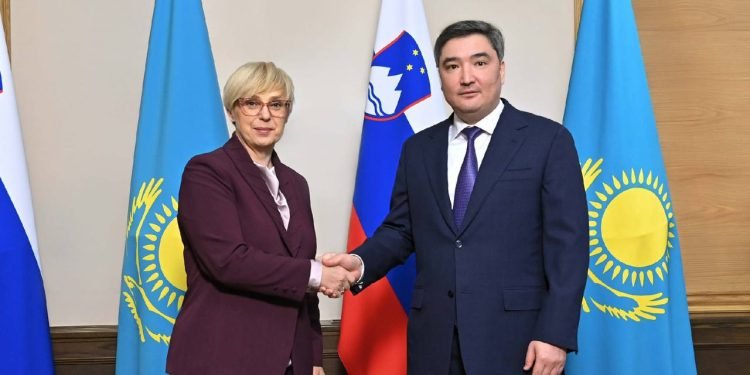By Maria Kalamatas | April 2, 2025 | The Logistic News
Astana, Kazakhstan – In a decisive step toward greater Eurasian integration, Kazakhstan and Slovenia have reaffirmed their commitment to deepening economic ties, particularly in trade, logistics, and industry. The pledge was made during a high-level business forum on April 1, attended by Kazakh President Kassym-Jomart Tokayev and Slovenian President Nataša Pirc Musar.
As Kazakhstan accelerates its drive to become a key logistics hub for Eurasia, President Tokayev highlighted the nation’s record-breaking achievements and its determination to build on that momentum.
“Kazakhstan continues to be the largest and one of the fastest-growing economies in the region. Our GDP has reached $288 billion, with a growth rate of 4.8%, which is 1.5 times the global average,” said Tokayev.
Eurasia’s Emerging Logistics Powerhouse
Kazakhstan’s ambitions are backed by a strategic geographic position and ongoing investment in critical infrastructure. Tokayev emphasized that 90% of all overland trade between Europe and China now passes through Kazakhstan, with total cargo transport reaching 514 billion ton-kilometers, a 2.6% year-on-year increase.
Key corridors such as the Middle Corridor and North-South Corridor are being expanded, while ports like Aktau and Kuryk handled a record 4.5 million tons of Caspian Sea cargo in 2024—up 62% from the previous year.
“We look forward to sharing expertise and deepening cooperation with the Port of Koper, Slovenia’s largest port, to strengthen regional connectivity and trade facilitation,” said Tokayev.
Industrial and Energy Cooperation: A New Frontier
The bilateral agenda also focused on Kazakhstan’s vast energy and raw material resources. With 70% of its oil exports going to the EU, Kazakhstan also possesses three trillion cubic meters of natural gas and 34 billion tons of coal reserves. The nation produces 19 of the 34 rare earth elements deemed critical for the EU economy.
“Our formula is pragmatic—investments and technologies in exchange for raw materials,” Tokayev explained, referencing growing interest from global firms like Total, Eni, Masdar, and Svevind Energy in Kazakhstan’s renewables sector.
Leading Slovenian firms such as Iskra and Gorenje were acknowledged for their current operations in Kazakhstan, with Tokayev calling for further collaboration in industrial automation, smart technologies, and sustainable manufacturing.
Agriculture and Food Security in Focus
Kazakhstan’s growing role in global food security was also underlined. The country already exports agricultural products to more than 70 countries, and Tokayev expressed readiness to welcome Slovenian investment in Kazakhstan’s agro-industrial transformation into a high-tech sector.
Technology, Finance, and the Future of Innovation
Another area ripe for cooperation is IT and digital innovation. Tokayev invited Slovenia’s tech firms and academic institutions to partner on research, startup development, and educational initiatives.
Additionally, he promoted the Astana International Financial Centre (AIFC) as a platform for Slovenian investors, offering a regulated and modern ecosystem for cross-border capital engagement.
“We believe this is just the beginning of a deeper and broader economic partnership,” said Tokayev, noting that implementation of bilateral agreements will be overseen by the Intergovernmental Commission on Cooperation.
President Pirc Musar’s visit to Kazakhstan, which also included talks with Prime Minister Olzhas Bektenov, marked a symbolic and strategic moment as the two nations look ahead to more concrete projects in logistics, industry, and innovation.
As Kazakhstan positions itself as Eurasia’s logistics keystone, partnerships like this with Slovenia demonstrate the country’s drive to connect East and West not only through trade, but through shared ambition.























